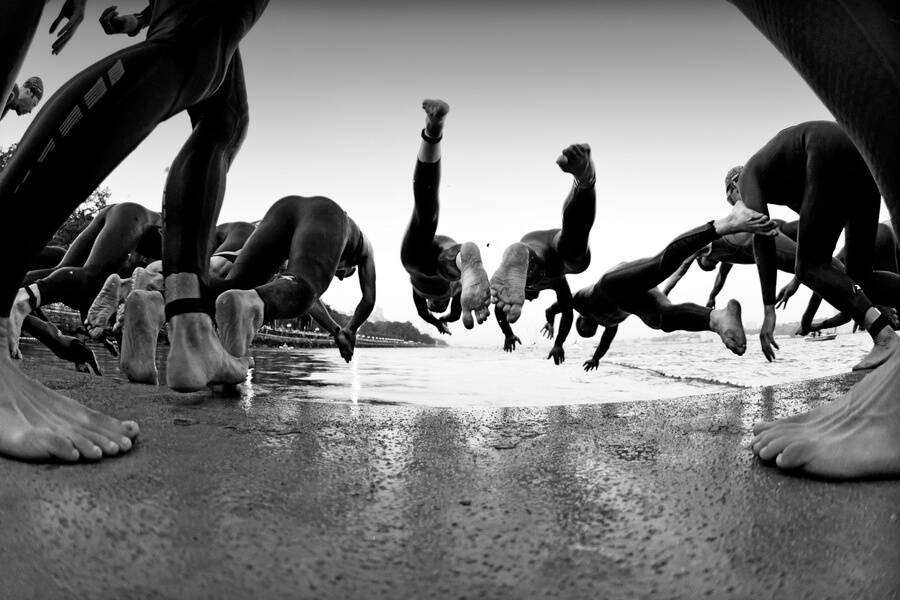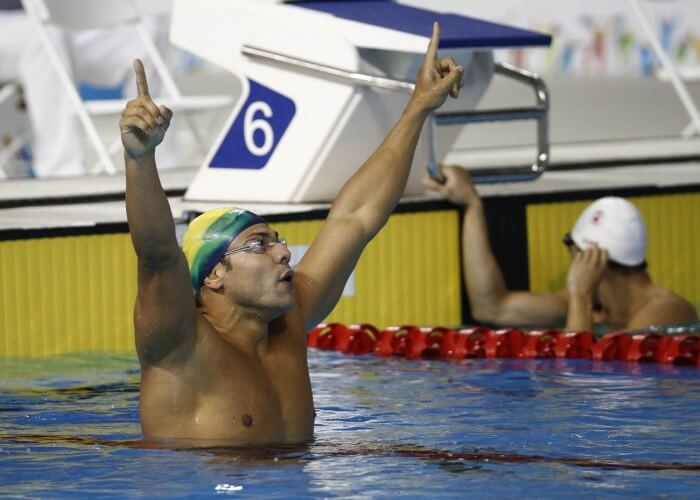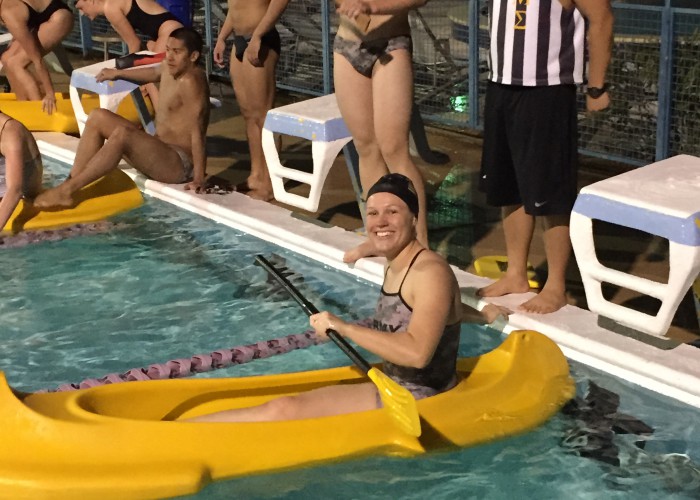Filling the Void In Life After Swimming

By Eric Bugby, Swimming World Contributor
Swan Song
My last race came in the spring of 2007. It was over eight years ago, but it’s seared in my memory. I was tired, not just from a four-day prelims and finals meet, but also from a five-year collegiate career that included transferring schools, a red-shirt year, and a deep bag of mistakes.
I was swimming well that year; training hard despite labrum surgery in the summer and adding the 200 fly and 200 IM to my meet lineups (two events I had never raced).
I’m behind the blocks with Eminem on my iPod (no iPhone yet) and tightening my Speedo Fastskin II (no FS Pro yet and let’s not talk about just missing the polyurethane suits).
The plan was to lead off the 400 free relay and make NCAAs.
At the beginning of the season.
Now, the plan was to lead off the 400 free relay and not complain in front of my teammates. There were too many emotions. The main one was fear. It was the fear of failure and fear of fatigue, something I fought my entire career. I also felt pride. I was proud of my team and teammates. They were swimming fast and I wanted to contribute. I remember being happy. I was thrilled because it was my last race.
As soon as I finished, I didn’t smile, I laughed. It was a laugh shrouded in “what ifs,” the worst feeling a swimmer can have. I cheered on my three other teammates. We won that relay, but the most rewarding victory was releasing my cap and goggles into the trash located 10 feet behind lane four.
The Emptiness
Based on that day, I should have been forever satisfied my swimming career was over. I wasn’t satisfied. It could have been the “what ifs” or coming close to my goals or something else, something metaphysical.
Not everyone ends their career under duress, but it eventually ends and leaves a hole, a void. Some voids start small. You don’t feel its pull immediately. It can mask itself as euphoria: the free time, the food, the extra hours of sleep, the food.
But the void expands, engulfs the euphoria and pulls at past memories. It invokes a mental and physical response. Swimming is a sport, not a game. We don’t “play” swimming. We train and work hard at it. It’s an endurance sport, regardless of race distance. With all those yards, the early mornings, long weekends, weights, dry land, core, stretching, “recovery,” etc., our bodies become accustomed to that lifestyle. We yearn to fill that void with what we know.
Swimming was my addiction. When it was removed, the void grew and manifested itself as a lack of energy, an apathetic attitude towards exercise, and an overindulgence in food. I couldn’t pinpoint the root of these feelings, so it continued.
Self-reflection
It wasn’t until graduate school that I began to self-reflect.
It started when I was approached by a few masters swimmers to stop by the pool. I had free time after classes in the evening, so I showed up for a practice. My thought process was naïve, but it worked: “It’s only an hour long, how bad can it be.” It was only eight months since my last race, but that practice set everything in motion that would determine then next eight years.
I didn’t swim well that night, but I met new people, struggled with vigor to make intervals, laughed with the coaches, and shook with a fatigue that only swimmers know. Swimming was the missing link, but “swimming” is vague and encompassing, so I need to asked myself two questions:
- Why did I swim?
- What did I miss about it?
These are very simple questions, but they are the most important in self-reflection and evaluation for any swimmer at any level at any time in their career. I surmised that I swam for the meets and everything that came with racing: accomplishment, adrenaline, relays, teammates, all of it.
What I missed was winning. Winning is like Thanksgiving dinner with an endless appetite, each bite better than the next, each spoonful fueling the next. I didn’t always win, but each victory invigorated the next practice or early morning wakeup or weight session. It’s different for each person. Here are a few reasons that may resonate:
- The thrill of racing.
- That winning feeling.
- Doing whatever you can for your team.
- The camaraderie of teammates.
- Swimming is actually fun.
- Staying in shape.
- Looking in shape (very different than staying in shape).
- Scholarship money: access to college and graduating college.
- Having a professional career.
- Achieving your goals.
- Keeping your word.
Solutions
The only comparable feeling to the personal thrill of racing is the watching swimmers succeed. The look on their face after they see their time is priceless. It’s an amalgamation of relief (from all the hard work finally paying off) and bliss (of doing something you’ve never done before). Coaching is just one outlet for former swimmers. The void can be vast and may take a unique approach to subdue. The following three approaches are a good start:
The masters practice was fun, but I didn’t want to swim every day. I needed a new outlet that continued to spark my drive for success, winning, and love of swimming. I initially found my solution in coaching.
- Coaching. At any level. Find a demographic that you are passionate about. It ranges from summer league and learn to swim programs to college and masters. Each possesses its own challenges and rewards. Coaching is ultimately a teaching position where you give back to the swimming community and create strong teams. It takes patience, the ability to ask questions, and admitting that you don’t know everything about swimming.
- Masters. Yes, get back in the pool. The beauty of masters swimming is that you are in control. You can attend one practice per week or 10. You can finally swim all your worst events without the fear of being embarrassed or chastised by your coach. Masters swimming is low pressure and a great way to meet new people, enjoy your teammates, and attend meets with a team.
- Triathlon. This includes any distance of triathlon (swim-bike-run), aquathlon (swim-run), and aquabike (swim-bike). You already possess a major advantage over the field as a former swimmer. We have a reputation for not being “land athletes,” but that’s not true. Don’t fall victim to the stereotype: strengthen your ankles. Sprint triathlons are a great way to enter the sport. Be careful because it’s expensive and addicting. It feeds the desire to stay in shape and compete at a high level.








#SwimCoaching